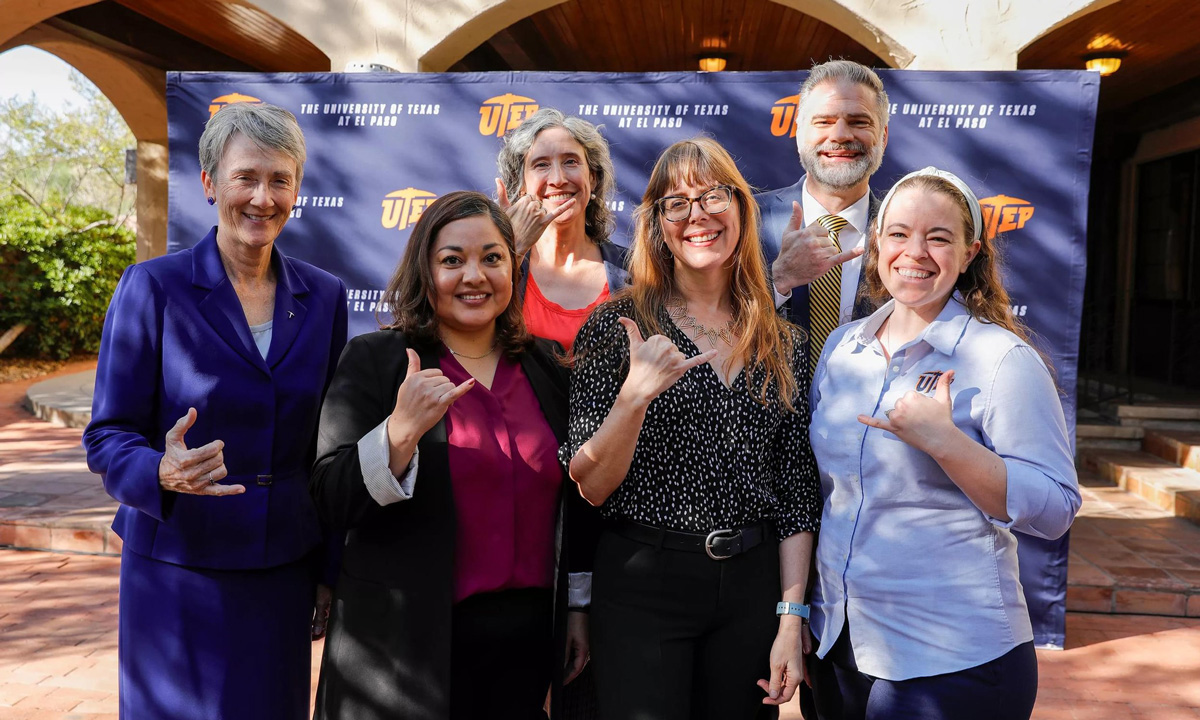University of Texas El Paso Tapped to Lead Center on Hispanic Student Success
'This particular grant signals UTEP’s leadership in research on effective practices to serve Hispanic students.'

Get stories like these delivered straight to your inbox. Sign up for The 74 Newsletter
The University of Texas at El Paso announced Wednesday that it will take a lead role in a new National Science Foundation-funded resource center that will support and strengthen Hispanic-Serving Institutions with their STEM-related grant applications.
The six-year, $7 million grant will establish the Hispanic-Serving Institution Center for Evaluation and Research Synthesis, or HSI-CERS, the nation’s only center of its kind. The center will work to help institutions better study and evaluate ways to verify and improve the effectiveness of NSF HSI-funded projects.
The center will be part of UTEP’s Diana Natalicio Institute for Hispanic Student Success. Anne-Marie Nuñez, executive director of the Natalicio Institute, is the grant’s principal investigator. She called the grant a landmark investment that emphasizes the university’s position as a leading HSI.
“This particular grant signals UTEP’s leadership in research on effective practices to serve Hispanic students,” said Nuñez, a leading scholar of HSIs and diversity in science. “UTEP gets positioned and recognized as a leader in creating knowledge in that area rather than having outsiders create that knowledge. As for the community, it’s really important that those of us who are on the ground here are creating that knowledge.”
Nuñez said the new center will assist other institutions that may lack the human or financial resources, as well as the capacity, to understand what they can do to create more equity in STEM, and more effectively reach students from diverse backgrounds. She added that through this work, UTEP will provide the first portrait of the collective effectiveness of these programs.
According to the NSF, the center will use interdisciplinary efforts to generate a model that tackles complex data through quantitative and qualitative methods. Researchers will develop standardized and comparable techniques to analyze NSF HSI-grant projects. It will create a database that future grantees can use for evaluations and a consistent evaluation framework, as well as offer training on how to use both.
Nuñez’s two HSI-CERS co-principal investigators are Azuri Gonzalez, director of partnerships and operations at the Natalicio Institute, and Amy Wagler, professor of mathematical sciences.
The assessments will help NSF HSI-funded programs that serve Hispanics and other minority students in fields of STEM – Science, Technology, Engineering and Mathematics.
The announcement was made on the patio of the Peter and Margaret de Wetter Center before a crowd of about 40 people made up mostly of university administrators, faculty and staff.
The HSI-CERS grant puts UTEP on the national stage alongside the NSF, said Jacob Fraire, president of the ECMC Foundation. Fraire, who has more than 35 years of professional higher education experience, previously served as director of policy and strategy for the Natalicio Institute. He was part of the team that submitted the grant proposal.
He called Nuñez an HSI expert who deserves a lot of the credit for the successful application that will make UTEP and the Natalicio Institute a focal point for prospective NSF grantees in regard to proposal evaluations for the next six years.
“You don’t have to submit your proposals to UTEP, and you don’t have to go to UTEP committees,” Fraire said. “But you certainly will be encouraged to do so because UTEP will have built the kinds of resources that would add value to your project.”
In addition to HSI-CERS, the NSF also named UTEP as one of five institutions that will lead a second related $7 million project focused on building community and collaborations among current and potential HSI awardees. It is the UNIDOS Network Resource Center for Community Coordination, or HSI-CCC. Florida International University is the lead institution. Meagan Kendall, associate professor in UTEP’s Department of Engineering, Education and Leadership, is one of the co-principal investigators.
Gonzalez said that she looked forward to future collaborations among the institutions through Kendall to expand knowledge of what works and what can be done better.
“Telling the story of Hispanic student impact right is no small feat, but we welcome that challenge because it is a story worth telling and learning from,” Gonzalez said.
Both new centers are part of the NSF HSI Program Network Resource Centers and Hubs.
“Building on past investments, these new centers will help NSF achieve its broadening participation goals in STEM by growing and strengthening the education and research support that facilitates student and faculty success at HSIs,” James L. Moore III, NSF assistant director for STEM education, said in a press release.
This article first appeared on El Paso Matters and is republished here under a Creative Commons license.
Get stories like these delivered straight to your inbox. Sign up for The 74 Newsletter

